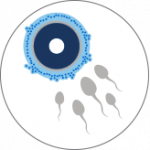Conceiving can be an exciting time. However, while for some women this may happen quickly, for others it can take longer, and this can cause difficulties or frustration. It is impossible to say how long it takes to get pregnant because it is different for everyone and many factors can affect a couple’s chance of conceiving, such as:

What is pcos?
December 20, 2019
What is iui?
February 26, 2020
Your Age

Your Reproductive Health

Medical Conditions
Once you have made the big decision to start a family, it is time to start planning how you are going to get pregnant. That’s because getting pregnant isn’t just about having regular sex; there are other things you can do to boost your chances of successful conception.
The Best Time to Get Pregnant
Before we go any further, let’s take a moment to discuss whether or not there is the best time to get pregnant. Despite having regular sex, there are specific times throughout the month where your chances of successful conception are heightened.
You are most likely to get pregnant if you have sex within a day or so of ovulation. An egg lives in your body for about 12-14 hours after being released and must be fertilised by a sperm within this time for pregnancy to occur. Furthermore, sperm can live for up to seven days inside a woman’s body. So, if you’ve had sex in the days before ovulation, the sperm will have time to travel up the fallopian tubes and “wait” for the egg to be released.
Get Tested by Your Doctor
Before you begin trying to conceive, it is a good idea to visit your doctor and get tested. Your doctor will review your medical history and talk about any conditions you have that might affect your fertility, such as thyroid disease, diabetes, endometriosis and lupus. If for example, you have epilepsy or high blood pressure, your doctor may advise you to get control of the disease before you try for a baby.
Depending on your family’s medical history, your doctor may want to test if you or your partner are carriers of any genetic conditions. Your doctor will also check your vaccinations are up-to-date. They will also recommend that women planning a pregnancy get the flu shot as contracting the flu can lead the severe complications, such as pneumonia or preterm labour. If you have any concerns or are planning to start trying for a baby, inform your doctor so that you can talk about any concerns you may have.
Stop Taking Birth Control
Although it is possible to get pregnant as soon as you stop taking birth control, for many women it can take a while for their hormones to return to normal. Therefore, if you’re using a hormonal method of birth control, stop taking it ahead of time to let your body adjust before you start trying. Stopping birth control ahead of time can help give you time to reacquaint yourself with your menstrual cycle and learning how to track it.
It can take your menstrual cycle time to return to normal after stopping hormonal birth control. You are more likely to have anovulatory cycles, short luteal phases and late ovulation in your first few menstrual cycles after stopping the pill, which can make it harder to get pregnant. Which is why women find it beneficial to stop taking the pill a few months before trying to get pregnant, so their body has the chance to return to normal.

Prepare Your Body for Pregnancy
The healthier you are, the better chance you have of getting pregnant. There are numerous lifestyle changes you can make while trying to conceive that will heighten your chances of getting pregnant. Self-care can go a long way. It is no secret that pregnancy causes major changes in your body but you can get yourself off to the best chance by taking some necessary steps towards a healthier lifestyle. Here, we have outlined some helpful lifestyle changes to help boost your chances of getting pregnant.

Have Frequent Intercourse
If you want to get pregnant, one of the best ways to do this is by having intercourse with your partner frequently. Some people argue that planning when they have intercourse around when they ovulate can be stressful and cause them to have less enjoyable sex as a result. Therefore, one recommendation is simply to have regular intercourse.

Quit Smoking
Smoking has numerous and very significant negative impacts on your health and attempts at conception. Furthermore, smoking is linked to an increased risk of miscarriage and ectopic pregnancies. Smokers also have significantly lower levels of oestrogen, which could lower the probability of ovulation in any given menstrual cycle and potentially affect pregnancy. Smoking can also negatively impact the quantity and quality of your partner’s sperm, so, the sooner you both quit, the better your chances of conception and a healthy pregnancy.

Reduce Your Alcohol Intake
While an occasional glass of wine isn’t known to affect your fertility, consider skipping alcohol while you are trying to conceive to heighten your chances. No amount of alcohol intake is encouraged or considered safe while you are trying to conceive and, therefore, doctors suggest stopping it altogether while you are trying to get pregnant.

Track Your Ovulation
Tracking your ovulation is extremely helpful when planning conception and you can increase your chances of becoming pregnant. To understand more about your menstrual cycle and ovulation, read our article on The Definitive Guide to Ovulation here.
Tracking your ovulation can also be done by using ovulation tests. Ovulations tests detect the surge of the luteinising hormone which peaks before ovulation. By using an ovulation test, you can have confidence that you are maximising your chances of getting pregnant.

Take Prenatal Vitamins
It is never too early to start taking prenatal vitamins as they contain folic acid, which has been found to be critically important for a baby’s development. Folic acid helps to promote ovulation, encourage fertilisation and supports embryo survival, so it is highly recommended to take folic acid while you are trying to get pregnant. You can also get similar benefits from foods like spinach, strawberries, beans and orange juice which are all naturally high in folate acid.
When to Talk to a Doctor
If you don’t conceive straight away, don’t panic. Conception can take up to a year for most healthy couples. However, it is good to know when you should ask for help. If you are under 35 years of age and have been trying for a year, it is worth booking an appointment to see your GP who can test you for any underlying fertility problems and give you advice. If you are over 35 years of age and have not been able to get pregnant after six months of trying, contact your GP for further advice.
Infertility affects both men and woman and can be extremely difficult, but treatment is available. In some cases, fertility specialists offer the best hope for having the family you’ve always dreamed of. If you would like further information about assisted reproductive treatments, please do not hesitate to get in touch. Our friendly team are always here to help.



